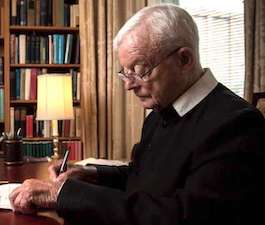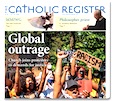Father Jonathan Robinson dies at 91
- FATHER RAYMOND J. DE SOUZA
The death of Fr. Jonathan Robinson of the Toronto Oratory is a sadness both for those who knew him and those many more who admired him from afar.

Evening eventually comes for all, and is welcomed by those who have borne the burden and heat of a long day — he was 91 when he died on June 3 — in the vineyard of the Lord. His patch of that vineyard bore abundant fruit and his death was grace-filled. He died at home, his final illness having begun a week earlier on the feast day of his patron, St. Philip Neri.
The Oratory of St. Philip Neri which Fr. Robinson founded in 1975 in Montreal — it moved to Toronto in 1979 — was introduced to the English-speaking world by St. John Henry Newman, the Church's newest saint. There was something of Newman's life in that of Fr. Robinson. Both were converts to Catholicism, men of great intelligence and a scholarly bent, whose pastoral work as priests brought them into contact with people of all walks of life, many of whom had no inkling of their intellectual work.
Newman lived to 89 years of age, Robinson 91. Just as our dominant images of St. John Henry are that of an old man, so too many of us only knew Fr. Robinson as a senior citizen. When I went to study at the St. Philip's Seminary — operated by the Toronto Oratory — in 1996, he was already 67 years old. Which means that many generations, including my own, were not present for the most dynamic years of his ministry, when he was at the same time a pastor, a newspaper columnist, a lecturer and founder of a seminary, all alongside building up the Oratory to be one of the largest in the world.
His "senior" years would be most productive, with several acclaimed books, including The Mass and Modernity: Walking to Heaven Backwards. The subtitle was taken from one of Newman's sermons, about how we make our way to Heaven in fits and starts, by trial and error, following straight and crooked lines. The book shows Fr. Robinson as both a gifted philosopher — he was chairman of McGill's philosophy department for three years in the 1970s — and priest who loved the sacred liturgy.
My favourite book of his remains not his more significant works, but a collection of his columns written for this newspaper, Jesus Christ: Revelation of the Unknown God. His capacity to combine biblical theology, philosophical erudition and pastoral good sense was a rare gift. His column on the women of Easter morning, that they discovered the most astonishing good news of the Resurrection because they were faithful to an ordinary duty of custom and respect — anointing a body for death — has shaped my thinking about Easter. We discover the glories we know by faith through fidelity to the regularity of piety and tradition.
A gifted philosopher who taught me modern philosophy, perhaps it is odd that what I most remember from his classes was a phrase of St. Ambrose that he quoted so often that I memorized it: Non in dialectica complacuit Deo salvum facere populum suum. He translated it thus for us: It did not please God to save His people through logic-chopping.
Logic — or any other human reasoning — would not have picked Holy Family Parish in Parkdale as a safe harbour in storm-tossed times for the faith, for the Catholic tradition, for the splendour of the liturgy, for the magnificence of sacred music, for the exemplary philosophical training of seminarians. And yet it pleased God to bring Fr. Robinson to Parkdale, a neighbourhood rather different from his upbringing and priestly life in Montreal. There he and his brother Oratorians flourished, to the great benefit of the Church. It pleased God to save many souls through the preaching, confessions, spiritual direction and pastoral care of St. Philip's band on King Street West.
One of the many crises in the Church of the 1970s and 1980s was the total collapse, and then absence, of sound philosophical training in priestly formation. The Catholic philosophical tradition is the "handmaid of theology"; without knowing that tradition, it is possible to think about theological topics, but it is not really possible to think theologically. That's why a great many priests do not know how to think theologically, lacking as they do the necessary foundation in philosophy.
Fr. Robinson and the Oratory set out to remedy that in 1986 with the establishment, at the invitation of Cardinal Emmett Carter of Toronto, of St. Philip's Seminary. Thirty-four years later, more than two hundred priests have been formed philosophically there, a gift for which I remain immensely grateful. All of my priestly work is built upon the foundation I received there.
The crisis in philosophical formation is now 50 years old, but has been adequately addressed in relatively few places. There are still far too many seminarians who, lacking an adequate training in philosophy, are being prepared to be sent as priests unarmed into battle. That they will lose that battle follows logically. Thus the signal achievement of St. Philip's Seminary, to say nothing of the rest his undertakings, should not be understated.
Fr. Robinson's established his Oratory in Montreal at the same age, 46, that Newman established his Oratory in Birmingham. Fr. Robinson would die as superior of the Toronto Oratory, a post he held for a remarkable 45 years.
My most enduring memories of Fr. Robinson were at the altar, the centre of his life. While the 50th anniversary of his ordination in 2012 was grand affair in Toronto, he chose to spend his 40th quietly in Rome. I was studying there at the time and offered to make the arrangements for him to offer the Holy Mass at the "altar of the tomb," just a few metres away from where the bones of St. Peter are kept under the papal altar in the Vatican basilica. He had been ordained there on May 13, 1962.
He was grateful but preferred to celebrate at the tomb of St. Philip Neri at the Roman Oratory. It was a private Mass, and I think there were only two of us there. I thought that the other person present — a random pilgrim who happened to be praying there — had no idea of how important this man was, and the occasion. Fr. Robinson followed the motto of St. Philip, amare nesciri — to love being hidden — and proposed it the very talented and accomplished men he attracted to the Oratory.
When I was a seminarian at St. Philip's I had the task of assigning seminarians to serve whatever Masses were scheduled. At that time, when Fr. Robinson had a private Mass, he preferred to have it Latin, according to the novus ordo. While most of us could easily handle the Latin responses, he also wanted the readings done in Latin. That was far more difficult, and if I assigned one of the other brothers, he would stay up for hours rehearsing. So I made an arrangement with Fr. Robinson; I would serve the Mass and read in Latin, but I would not rehearse. He accepted and kindly offered to correct whatever mistakes I might make.
Fr. Robinson followed the motto of St. Philip, amare nesciri — to love being hidden — and proposed it to the very talented and accomplished men he attracted to the Oratory.
They were abundant, week after week. Some days every single sentence had a pronunciation mistake. In the sacristy, after removing his vestments, he would correct one of them. It became as fixed a part of our post-Mass ritual as the thanksgiving he would make later in the chapel.
Always a correction, but despite mistakes aplenty, always only one. I learned an essential priestly lesson from that. Fathers must correct their sons if they are to improve, but if the sons are to actually improve, the corrections cannot be too burdensome. A vast number of people — priests and lay faithful alike — improved in wisdom, stature and in favour with God because of Fr. Robinson's fatherly guidance.
Those private Masses were most often a votive Mass of the Holy Trinity, his customary preference. I recalled that with gratitude this Trinity Sunday, which fell between his death and his funeral. Now beholding the glory of the Blessed Trinity, Deo volente, Fr. Robinson will be hidden no longer, together with saints from every age, the women at the tomb, Ambrose preaching in Milan, Philip reforming Rome and Newman having shone a kindly light for all of us who aim to reach Heaven walking backwards.
 This is Meaghen Gonzalez, Editor of CERC. I hope you appreciated this piece. We curate these articles especially for believers like you.
This is Meaghen Gonzalez, Editor of CERC. I hope you appreciated this piece. We curate these articles especially for believers like you.
Please show your appreciation by making a $3 donation. CERC is entirely reader supported.

Acknowledgement
 Father Raymond J. de Souza. "Father Jonathan Robinson, longtime head of Toronto Oratory, dies at 91." Catholic Register (June 9, 2020).
Father Raymond J. de Souza. "Father Jonathan Robinson, longtime head of Toronto Oratory, dies at 91." Catholic Register (June 9, 2020).
This article is reprinted with permission from Father de Souza and the Catholic Register.
The Author
Father Raymond J. de Souza is the founding editor of Convivium magazine.
Copyright © 2020 Catholic Register



